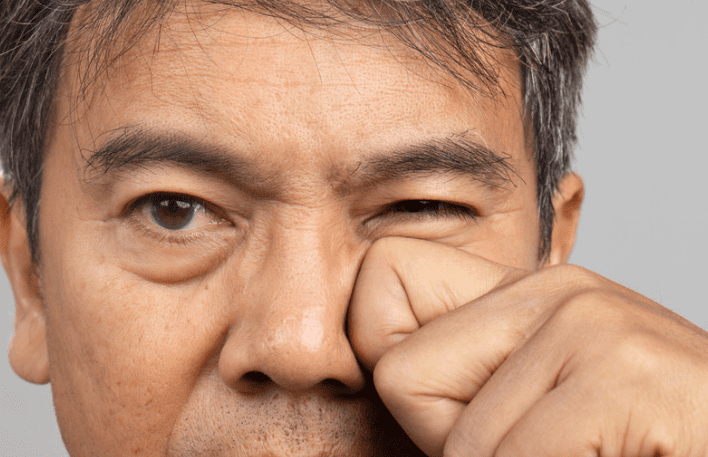How to Make Your Eye Stop Twitching (Because Nobody Needs a Mysterious Wink)
We’ve all been there: sitting at our desks, scrolling through cat videos, and suddenly—bam—our eyelid starts doing the cha-cha. Eye twitches are like that uninvited guest who shows up, overstays their welcome, and refuses to explain why they’re here. Annoying? Absolutely. Mysterious? You bet. But before you start Googling “Is my eye possessed?” (spoiler: it’s not), let’s talk about why this happens and how to kick that twitch to the curb. And hey, if things get too weird, we’ll even clue you in on when it’s time to call the pros—like our team at Liberty Laser Eye Center in Vienna, Virginia.
Why Is My Eye Twitching? Let’s Solve the Mystery
First off, relax—you’re not turning into a cartoon character. Most eye twitches (or myokymia, if we’re getting fancy) are harmless and temporary. They’re usually your body’s way of saying, “Hey, slow your roll.” Here’s the lowdown on common culprits:
- Stress: The ultimate party crasher. Stress tightens muscles, including those tiny ones in your eyelids.
- Caffeine Overload: That third espresso? It might be why your eye’s doing the salsa.
- Dry Eyes: Blame screens, allergies, or Virginia’s pollen season. Dryness = irritation = twitch city.
- Fatigue: Pulling an all-nighter? Your eyelids might revolt.
- Nutrient Deficiencies: Low magnesium or potassium can make nerves throw a tantrum.
But what if the twitch sticks around longer than that one-hit wonder from 2003? Let’s dig deeper.
Quick Fixes to Silence Your Eyelid’s Solo Performance
Hydrate Like It’s Your Job
Dry eyes are a top twitch trigger. Grab artificial tears (not the “get rid of red eyes” stuff—those can backfire). Pro tip: If you’re in the Washington DC area and dryness won’t quit, swing by Liberty Laser Eye Center for a Dry Eye Treatment eval. We’ve got solutions that’ll make your eyes feel like they’re sipping margaritas on a beach.
Ditch the Double-Shot Lattes
Cut back on caffeine for a day or two. IMO, this is easier said than done (RIP, my morning ritual), but your eye will thank you.
Sleep. No, Really.
Aim for 7–8 hours. If insomnia’s your nemesis, try a warm compress on your eyes before bed. It’s like a spa day for your face.
Stress Less, Twitch Less
Meditation, yoga, or screaming into a pillow—whatever works. FYI, chronic stress can also worsen conditions like Nearsightedness or Astigmatism, so keep those peepers calm.
When to Call in the Pros (aka Us)
Most twitches vanish on their own. But if yours lasts weeks, spreads to other face muscles, or comes with swelling/vision changes? Houston, we have a problem. These could signal issues like:
- Blepharospasm: A rare disorder causing involuntary spasms.
- Keratoconus: A cornea-thinning condition we treat with Corneal Cross-Linking (think of it as a “cornea gym” to strengthen tissue).
- Neurological Conditions: Rare, but worth ruling out.
At Liberty Laser Eye Center, we specialize in everything from routine Annual Eye Exams to advanced procedures like Topography-Guided LASIK Surgery and PresbyLASIK Surgery. Not to brag, but our Lasik doctors have a success rate that’ll make your twitchy eye blink in admiration.
Preventing Future Twitch-Apalooza
| Trigger | Solution |
|---|---|
| Screen Time | Follow the 20-20-20 rule: Every 20 mins, look 20 feet away for 20 seconds. |
| Nutrient Deficiencies | Load up on bananas (potassium), spinach (magnesium), or supplements. |
| Chronic Dryness | Invest in a humidifier or ask us about long-term Dry Eye Treatment. |
| Untreated Vision Issues | Correct Nearsightedness, Farsightedness, or Presbyopia with Lasik Eye Surgery. Fun fact: Many of our patients ditch glasses AND reduce eye strain post-surgery. |
“But Wait, What About Laser Eye Surgery?” Glad You Asked.
If twitching stems from uncorrected vision issues (looking at you, Astigmatism), procedures like Advanced PRK Surgery or Wavefront Analysis-guided LASIK might be game-changers. At Liberty Laser Eye Center, we tailor treatments to your eyes—because nobody’s corneas are the same. Worried about Lasik recovery? Most folks are back to Netflix marathons in 24–48 hours.
And yeah, we know “affordable” and “Lasik” don’t always go hand-in-hand. But compared to a lifetime of glasses/contacts? The cost is a steal. Plus, we offer financing because your eyeballs deserve VIP treatment.
FAQs: Because Googling “Eye Twitch” at 2 AM is a Bad Idea
1. Can stress alone cause eye twitching?
Yep! Stress is the Beyoncé of triggers—powerful and everywhere. Manage it, or let us help with holistic eye wellness strategies.
2. Are certain eye surgery types riskier for twitching?
Nope. Modern procedures like Topography-Guided LASIK are precise. Our Lasik eye surgeons use tech so advanced, it’d make NASA jealous.
3. Should I panic if both eyes twitch?
Only if they’re synced to “Thriller.” Kidding—but do get it checked if it’s persistent.
4. How do I find the best Lasik surgeon near me?
Look for certifications, reviews, and a team that doesn’t rush you. Cough We’re in Vienna, Virginia, just a short drive from Washington DC. Cough
Final Thoughts: Keep Calm and Twitch Less
Most eye twitches are just your body’s quirky way of saying, “Chill out.” But if yours evolves into a full-on eyelid rave, remember: Liberty Laser Eye Center is nearby, ready to help with everything from Annual Eye Exams to cutting-edge laser eye surgery. Whether you’re battling Keratoconus or just need a Wavefront Analysis, we’ve got your back (and your corneas).
So next time your eye starts dancing, take a breath, hydrate, and maybe lay off the espresso. And if all else fails? You know where to find us. 😉
Ready to kick twitches (or glasses) to the curb? Contact Liberty Laser Eye Center in Vienna, Virginia—your closest destination for happy, healthy eyes.

